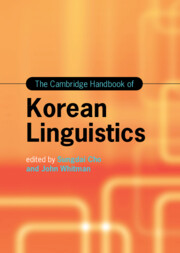Book contents
- The Cambridge Handbook of Korean Linguistics
- Cambridge Handbooks in Language and Linguistics
- The Cambridge Handbook of Korean Linguistics
- Copyright page
- Contents
- Figures
- Tables
- Contributors
- Preface
- Acknowledgments
- Abbreviations
- Part I Korean Overview
- Part II Phonetics and Phonology
- Part III Morphology and Syntax
- Part IV Semantics and Pragmatics
- Chapter 17 Subjectivity and Intersubjectivity in Korean Grammar
- Chapter 18 Discourse Studies in Korean
- Chapter 19 Metaphoric and Metonymic Patterns with the Body-Part Term Nwun “Eye(s)” in Korean
- Chapter 20 Wh-Indefinites
- Chapter 21 “Expletive” Negation in Korean
- Chapter 22 Case Stacking in Korean: Argument Structure or Information Structure?
- Part V Sociolinguistics and Psycholinguistics
- Part VI Language Pedagogy
- Index
- References
Chapter 20 - Wh-Indefinites
from Part IV - Semantics and Pragmatics
Published online by Cambridge University Press: 30 September 2022
- The Cambridge Handbook of Korean Linguistics
- Cambridge Handbooks in Language and Linguistics
- The Cambridge Handbook of Korean Linguistics
- Copyright page
- Contents
- Figures
- Tables
- Contributors
- Preface
- Acknowledgments
- Abbreviations
- Part I Korean Overview
- Part II Phonetics and Phonology
- Part III Morphology and Syntax
- Part IV Semantics and Pragmatics
- Chapter 17 Subjectivity and Intersubjectivity in Korean Grammar
- Chapter 18 Discourse Studies in Korean
- Chapter 19 Metaphoric and Metonymic Patterns with the Body-Part Term Nwun “Eye(s)” in Korean
- Chapter 20 Wh-Indefinites
- Chapter 21 “Expletive” Negation in Korean
- Chapter 22 Case Stacking in Korean: Argument Structure or Information Structure?
- Part V Sociolinguistics and Psycholinguistics
- Part VI Language Pedagogy
- Index
- References
Summary
Chapter 20 investigates the longstanding and controversial topic of the indefinite reading of so-called wh-words in Korean. The chapter reviews arguments regarding their historical development, typological observation, grammatical properties, and processing strategies.
Keywords
- Type
- Chapter
- Information
- The Cambridge Handbook of Korean Linguistics , pp. 581 - 606Publisher: Cambridge University PressPrint publication year: 2022

